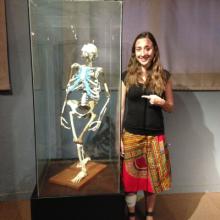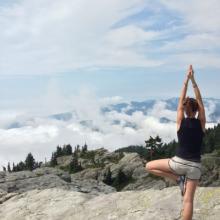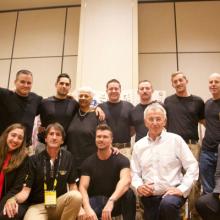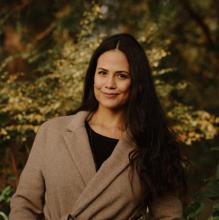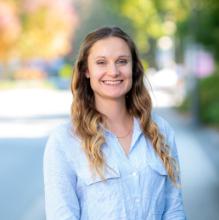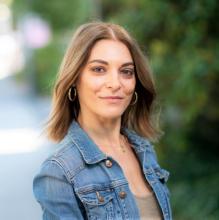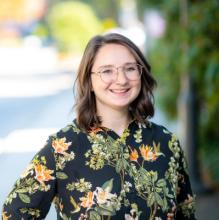Research is most likely to have real world impacts when researchers work with those outside the academy to design, conduct, and share it. There are many barriers to this. My doctoral research investigates new methods to foster effective and mutually beneficial collaboration between researchers and these knowledge users. I hope my work will give people new tools to work together and change their environments.
Research Description
Traditionally, researchers conducted their work independently and then gave their results to those they hoped would use the research findings. These knowledge users were rarely involved in the research process or consulted about how research should be shared. We now know this approach rarely works. Research is more likely to be used in the real world when researchers and knowledge users work together. This ongoing collaboration, aimed at using knowledge from research and lived experience to drive change, is called knowledge translation (KT). Despite its potential, KT remains a challenge in academic and health settings. Barriers include a lack of skills, incentives, and resources for KT. Ineffective collaboration is also a common barrier. Collaboration between people involved in KT can be hindered by different workplace cultures, inherent power imbalances, a lack of time and resources dedicated to collaboration, and unequal benefits for participation in KT. How do we support mutually beneficial collaborations between researchers and knowledge users doing KT? This is the central question driving my doctoral research.
What does being a Public Scholar mean to you?
To me, public scholarship is doing research in ways that are action-oriented and grounded in the principle that everyone should benefit from the research process. It is moving out of the ivory tower so researchers can meaningfully be part of solutions to the complex problems we face – like racism, climate change, and health inequity. Being a Public Scholar creates the opportunity to do public scholarship in graduate school while also establishing a network of others engaged in similar work that you can learn from.
In what ways do you think the PhD experience can be re-imagined with the Public Scholars Initiative?
Public scholarship must be nourished through adequate resources, support, and collaborative decision-making. Unfortunately, academic institutions and funding organizations make it hard to do these things. The Public Scholars Initiative provides the support to overcome these barriers. In doing so, doctoral students are free to envision new ways to do research. This initiative allows me to combine my experiences as a program evaluator, theatre producer, and epidemiologist to reimagine research-based theatre as a KT intervention. Moreover, it allows me to meet others who have dared to imagine a different doctorate. This gives me ideas, helps refine my thinking, and renews my courage to try something new.
How do you envision connecting your PhD work with broader career possibilities?
By engaging in public scholarship during my PhD, I believe I will be a better implementation scientist. Research must start and end outside of the academic world. I envision my research connecting to the broader movement of solving health problems collaboratively. I hope it creates a new way for patients, healthcare providers, and academics to work together to create more relevant research and more effective health interventions.
How does your research engage with the larger community and social partners?
Arts-based research draws on our shared ability as humans to tell and understand stories. It allows us to learn about ourselves while also better grasping others' experiences. Art-based research is more accessible than many traditional research approaches as it does not require specialized training to deeply understand complex ideas. Moreover, it is also more reciprocal as there are many positive outcomes from creating and/or experiencing art. When combined with frameworks and theories of implementation science and evaluation, RBT can create new ways to co-design research programs and health interventions for (I hope) better engagement with the larger community and social partners.
Why did you decide to pursue a graduate degree?
To be honest, when I graduated from my Masters program, I was convinced I would never come back to school. I fell in love with program evaluation and found that I thrived in the action of implementation. I worked as an evaluator at a hospital-based consulting group and then at a national health charity. After several years, I realized how much time I spent trying to get meaningful collaboration between healthcare providers, patients, decision-makers, and researchers. I was regularly unsuccessful. My efforts were too often derailed by limited budgets, tight timelines, inherent power imbalances, and working in systems that favoured those with academic degrees.
I then did a favour for my best friend and my life changed.
She asked me to co-produce a theatre play. I had zero experience but she needed help so I said yes. Opening night I was blown away as the play sparked the most thoughtful and engaged discussion around sexual assault I have ever seen. I was wowed by the unique power of theatre to show audience members different perspectives. Regardless of personal experiences, the audience could draw upon scenes and characters to explain their point of view. Everyone at the show could relate to these scene and characters thus creating a shared experience. I began to wonder how theatre could be used to promote collaboration between patients, healthcare providers, and researchers. I decided to get my PhD to explore this curiosity.
Why did you choose to come to British Columbia and study at UBC?
UBC uniquely offers an Interdisciplinary Studies PhD program where I worked with two co-supervisors to design a doctoral degree that built upon my work experience. I was able to pick classes tailored to my research goals. I also have been lucky to be co-mentored within the School of Public and Population Health and the Faculty of Education. This unique structure enables co-supervision by a Canadian leader in arts-based health research and ethics (Dr. Susan Cox) as well as an actor and professor who is an international leader in RBT (Dr. George Belliveau). UBC has given me an unparalleled opportunity to do research that combines theories and frameworks from across multiple disciplines. It has also allowed me to have an incredible public health researcher and evaluator on my committee (Dr. Chris Lovato) who has helped me grow as a researcher while also strengthening my practitioner skills as an evaluator.
What is it specifically, that your program offers, that attracted you?
The interdisciplinary program is like a "Choose your Own Adventure" program. You are mentored by professors in two faculties and work together to decide what courses to take, what your comprehensive exams look like, and what research you'll do. It also challenges me to think beyond my training in Population and Public Health to develop an interdisciplinary approach to my research.
For you, what was the best surprise about graduate life, about UBC or life in Vancouver?
How beautiful it is here. You are riding your bike and then get a glimpse of the mountains, which never fails to wow. There are so many trees and plants that flower in the spring, the sunsets are outstanding, and you are never too far away from the ocean. You can get out to the mountains really easily so a hike is never too far away. You can't help but feel thankful and privileged with all this nature around.
What aspect of your graduate program do you enjoy the most or are looking forward to with the greatest curiosity?
I am really looking forward to data collection--the actually doing part of the research. I cannot wait to work with stakeholders to make the plan a reality and seeing all the adaptations, challenges, and outputs that transpire.
What do you like to do for fun or relaxation?
I try to get out of the city and hike as much as possible. Other things I enjoy include biking, cooking, craft beer, and picnics.
Do you have any tips for students from your home country coming to Canada / to UBC Grad School?
It is a marathon and not a sprint. As you are settling in and creating habits, make sure to include self-care in there or you will burn out. Take that time off to do things you love and get away from your computer so you can come back reenergized and are able to be productive.
Public scholarship is doing research in ways that are action-oriented and grounded in the principle that everyone should benefit from the research process.

